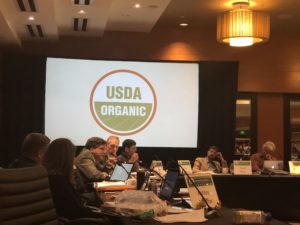
Last week the National Organic Standards Board (NOSB) convened for its spring meeting in Seattle, WA, not far from our home office in Port Townsend. Our staff participated in the National Organic Coalition’s (NOC) pre-NOSB meeting, where OSA’s Kiki Hubbard sat on a panel to discuss an NOSB proposal related to the interface of GMOs and organic farming. Specifically, the proposal explores how best to monitor the genetic integrity of seed used by organic growers.
Following this meeting, OSA co-hosted a lively reception with our friends at PCC Community Markets and Organically Grown Company. The reception was held at PCC Community Markets’ headquarters overlooking the expansive Puget Sound. It was a beautiful evening filled with organic food and organic policy friends. Thank you to our co-hosts!
The next day, the NOSB — a fifteen-member federal advisory committee — began working through a lengthy agenda that included reports from the National Organic Program (NOP), more than a day’s worth of public comments, and subcommittee reports on dozens of topics. OSA’s Kiki Hubbard and Cat McCluskey delivered public comments in support of the board’s work in the areas of organic seed, genetic integrity, and excluded methods.
Among the highlights of the event was the NOSB unanimously passing a proposal to strengthen the NOP’s guidance document on organic seed. Guidance documents help clarify the regulations for certifiers and provide instruction on how best to enforce them. OSA has provided comments on this proposal a number of times and we hope the NOP will swiftly implement the NOSB’s recommendations.
This improved guidance complements another NOSB decision made last fall, where the board passed a proposal to update the organic seed regulation. If adopted by the NOP, the new language will require that operations demonstrate improvement in sourcing organic seed and planting stock on an annual basis. Together, these two actions represent a milestone. We view this evolution in organic seed policy as a significant step toward a future where the integrity of the organic label is stronger because the critical first link in the organic production chain — the seed farmers plant — is also consistently organic.
Don’t miss our slideshow from these events below. And if you want to dig deeper into these policy issues, here are OSA’s written comments on the following topics:
Organic seed sourcing
Genetic integrity and transparency
Excluded methods
Excluded methods: Induced mutagenesis


